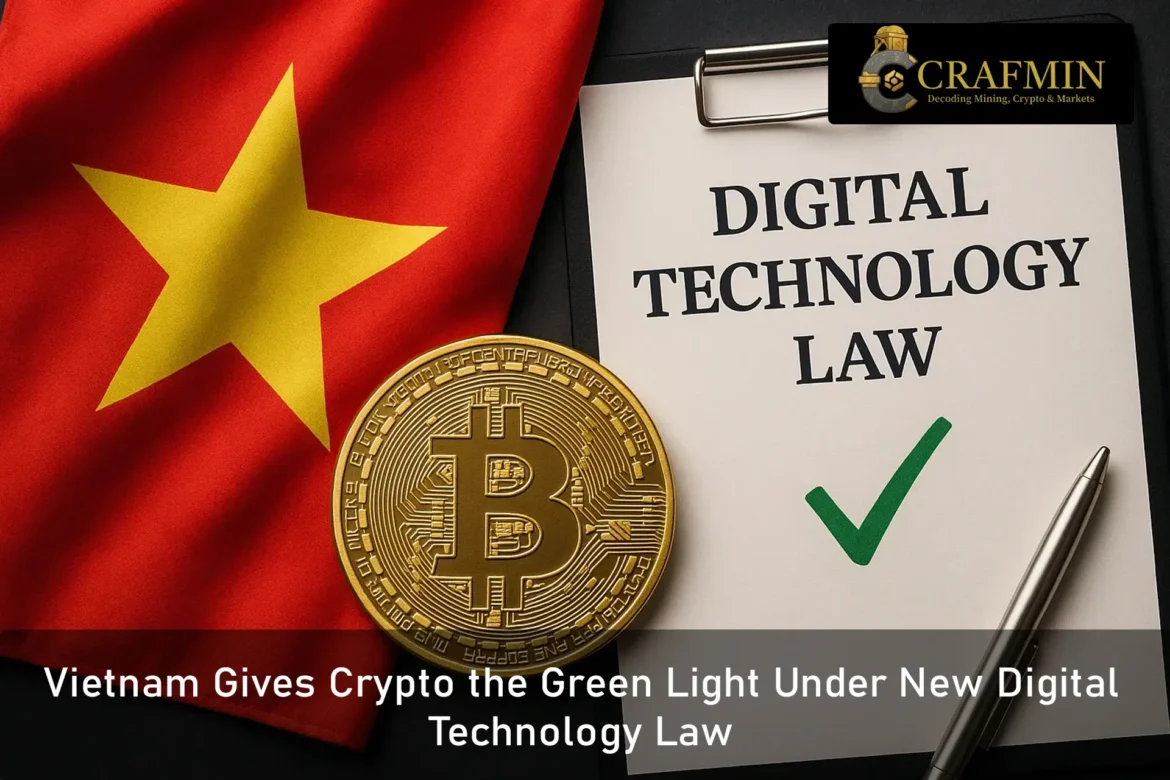Vietnam has taken the plunge into the world of digital assets, passing a fresh legislative framework designed to regulate crypto and encourage tech innovation. After years of sitting on the fence about digital currencies, Vietnam has finally laid down the law—bringing crypto assets under the legal spotlight through its newly passed digital technology legislation. This move draws a line under years of uncertainty and gives both businesses and regulators a clearer path forward.
The new law, which takes effect on 1 January 2026, marks a watershed moment in the country’s digital direction. Drafted by the Ministry of Science and Technology, it lays out detailed guidelines for the management of digital assets while introducing sweeping support measures for emerging technologies, including artificial intelligence and semiconductors.

Image 1: (Source: Freeman Law)
New Rules of the Game
Vietnam’s legislation doesn’t lump all digital assets together. Instead, it draws a clear line between virtual assets and crypto assets, treating each on its own terms. While both are digital and rely on encryption or technology to confirm ownership and transfers, neither includes securities, fiat-based tokens, or any other standard financial instruments. That distinction sets clear boundaries, keeping digital assets in their own lane while still giving them legal status.
Crypto assets, under this law, are digital by nature and function based on encryption. These are the likes of Bitcoin and other blockchain-based tokens. Virtual assets, meanwhile, are primarily used for trade or investment but do not act as currency substitutes. Both are now brought under formal regulatory oversight.
Under the framework, the government is tasked with determining exactly how these assets should be classified, monitored, and managed. It will also be responsible for spelling out business conditions and compliance obligations for companies operating in the digital space.
Turning Over a New Leaf
The law comes not a moment too soon. In 2023, the Financial Action Task Force (FATF) added Vietnam to its “grey list” due to concerns about gaps in anti-money laundering measures, particularly concerning virtual assets. The newly adopted law aims to put Vietnam back on the right side of international expectations.
Included within the framework are provisions that call on regulatory agencies to crack down on money laundering, terrorism financing, and the misuse of digital technologies for weapons development. The structure is built around international best practices, ensuring that Vietnam isn’t left out in the cold when it comes to global digital finance.
Tech Sector Gets a Tailwind
More than just crypto, the law sets the tone for Vietnam’s digital transformation. It aims to foster a thriving ecosystem for digital tech companies by offering a range of incentives. Businesses operating in sectors like AI, semiconductors, and software will be prioritised for tax relief, investment opportunities, and favourable land-use rights.
The law isn’t just talking the talk—it backs it up with practical steps to boost R&D, support high-tech manufacturing, and encourage public-private partnerships. There’s a clear focus on building the right foundations for long-term digital growth.
According to Le Quang Huy, the man steering the National Assembly’s science and technology panel, Vietnam has its eyes on the prize—working to cement its role as a heavyweight in the global chip supply chain and not just stand on the sidelines. He emphasised the strategic importance of developing every stage of the chip industry—from design and production to packaging and testing.
To make that vision stick, the legislation provides special provisions for companies active in the semiconductor sector. This includes support for research, funding for supply chain development, and policies to lure both foreign and local investment.
Human Capital at the Centre
Recognising that high-tech industries can’t run on empty, the law puts strong emphasis on skills and talent. Local governments will be expected to roll out policies that support workforce development, especially in areas related to AI, chips, and emerging digital tools.
Subsidies will be offered to help companies attract top-tier professionals and train existing staff. Upskilling and retraining programs will form part of the strategy, aimed at keeping the labour market fit for the demands of a rapidly evolving industry.
The law also calls for closer collaboration with educational institutions. Digital technology training, including AI literacy, will be integrated into national curricula. Assessment and certification of tech skills will follow international benchmarks, ensuring that Vietnam’s workforce can hold its own on the global stage.

Image 2: (Source: Decrypt)
Managing AI with a Firm Hand
The spotlight also falls squarely on artificial intelligence, with the law making it clear that AI isn’t being left on the back burner. The legislation takes a steady-as-she-goes approach when it comes to handling the risks tied to artificial intelligence—especially where high-risk systems are involved. While it gives the green light for growth and rollout, it keeps a firm grip on the wheel to avoid letting safety fall through the cracks.
Read Also: Blockchain Real Estate in Australia: The Rise of Tokenised Property
Guidelines will be introduced to monitor AI throughout its lifecycle, from development to deployment. The aim is to balance innovation with accountability—making sure businesses don’t bite off more than they can chew when working with complex systems.

